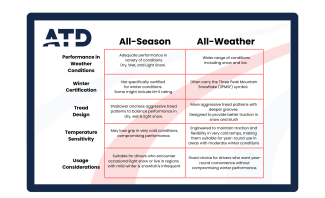All-Season vs. All-Weather


Have you found yourself wondering what the difference between all-season tires and all-weather tires? Most tire manufacturers now offer both compound options, which makes the decision even harder to make if you’re unsure of the difference. Let us help you determine if you need one of these types of tires.
As you’re shopping and browsing your tire size options, main factor to keep in mind is your driving terrain. The main difference between all-season and all-weather is the ability to offer different versatility for different weather conditions. All-weather tires provide better performance in winter conditions due to their specific design and certification. We can break it down to the specifics so you’re well equipped and educated to make the decision.

Think of the two types of tires in this way; footwear.
All-season tires are like versatile sneakers. They're comfortable for everyday wear and perform reasonably well in various conditions, whether it's a stroll in the park, a casual hike, or a light jog. If you're planning a serious mountain hike or expect to encounter deep snow or icy trails, you might find them lacking in traction and support.
All-weather tires, on the other hand, are your rugged hiking boots. They're designed to handle a wider range of terrain and weather conditions, including muddy trails, rocky paths, and even snowy slopes. With their specialized tread patterns and durable materials, they provide the grip and stability needed for more challenging environments.
While sneakers (all-season) might be good enough for most everyday situations, hiking boots (all-weather) will give you the added confidence and performance needed for more demanding adventures.
The choice between the two depends on your driving needs and the typical weather conditions in your area. We encourage you to visit your local Tire Pros location to talk to an expert about which tire type would best fit your lifestyle.


